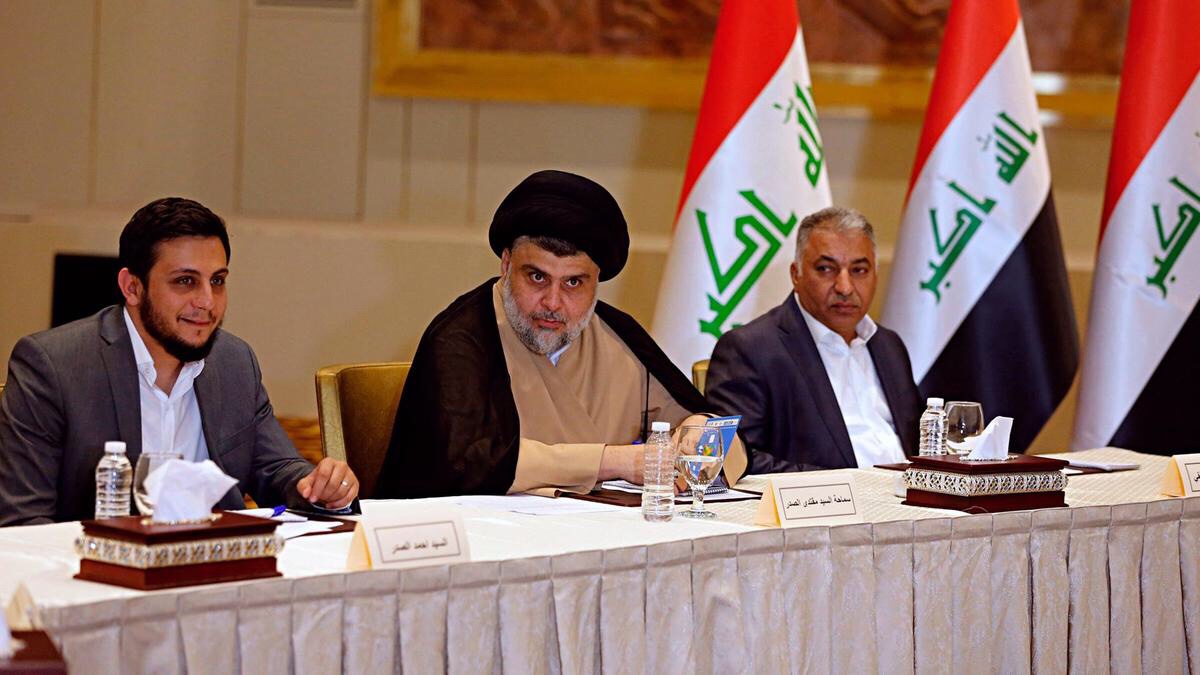
Shiite cleric Muqtada Al Sadr, center, whose coalition won the largest number of seats in Iraq's parliamentary elections, meets Prime Minister and other Iraqi politicians during the negotiations to form a new government in Baghdad, Iraq. AP
Sadr and Abadi lead major coalition seeking to be next Iraq government
The alliance needs 28 seats to gain a majority and then begin forming the next Cabinet
Mina Aldroubi
Iraq's Moqtada Al Sadr is leading a quartet of major parties looking to form the next government if they can secure just 28 more seats to meet the required majority in Parliament.
An agreement was reached on Sunday night between the populist cleric’s Sairoon coalition, Iraqi Prime Minister Haider Al Abadi’s Victory bloc, Ammar Al Hakim’s National Wisdom Movement and Ayad Allawi’s National Coalition. Together the four parties have 136 of the 329 seat house, just 28 short of a majority.
"We have come together to form the core for an alliance that is seeking to establish a new government. We have decided at this meeting to open up to our other partners to contribute together in the formation of this alliance," the four parties said in a statement on Monday.
The coalition also stated that it would take an anti-sectarian stance to the process of forming the next government.
"The coalition is determined to work hard to build a state of citizenship, justice, equality and the provision of a decent life for all our people," the statement said.
Mr Allawi, a former prime minister and currently a vice president, said his National Coalition would now hold urgent meetings with the major alliances to discuss a unified national approach.
"The meeting aims to discuss the formation of a national government that seeks to implement a national program in addition to ending the crisis that country is currently faced with," Khadem Al Shimmery, a prominent politician in Mr Allawi's bloc told The National.
Mr Al Sadr's 54 seats makes his Sairoon alliance the largest single party in parliament. Mr Al Abadi's Victory bloc won 42 seats, and together with Mr Al Hakim's National Wisdom Movement, which won 19 seats, and Mr Allawi's National Coalition which won 21 seats - the alliance has 136 seats out of the 329 seat house.
While the coalition of groupings is now well on the way to a majority, experts cautioned that there was still a long way to go to form a government.
"The group that involves Abadi-Sadr-Hakim-Allawi is way short of a majority right now and the fact they are using the phrase ‘the nucleus of the largest bloc’ may, in fact, be true, but remember splits within Mr Al Abadi's Victory coalition mean they don't have his full 42 MPs," Iraq analyst Kirk Sowell tweeted.
Meanwhile, talks are ongoing between Nouri Al Maliki, a former prime minister and currently a vice president, and Hadi Al Amiri, an Iran-backed militia leader, on potentially forming an opposition bloc. Mr Al Maliki's State of Law coalition won 26 seats, while Mr Al Amiri's Fateh bloc won 47 seats.
Kurdish parties have also signalled their willingness to join Mr Al Maliki's alliance. The Patriotic Union of Kurdistan (PUK) and the Kurdistan Democratic Party (KDP) have collectively secured over 40 seats in the elections.
Although there is no word on how close to an agreement the parties are, if all four enter a coalition they would have 113 seats - just 23 behind the Abadi-Sadr-Hakim-Allawi alliance and 51 short of a majority.
The two coalitions - if finalised - account for around 249 seats between them, meaning just 80 seats are held by the plethora of smaller parties and individuals not accounted for.
The results of the May 12 election were only ratified by the supreme court on Sunday, following allegations of fraud forced a partial recount of ballots.
Mr Al Abadi is heading a fragile caretaker government until its replacement can be agreed and has already had to contend with mass protests across the south at the state of basic government services.
The court's decision paves the way for President Fuad Masum to summon lawmakers to an inaugural session of the new, 329-seat house. In theory, parliament should then proceed to elect a speaker, a president and a prime minister, who will, in turn, form a new government within 90 days.
Yet, political wrangling over who is appointed prime minister will likely delay the process for weeks or even months.
The recount confirmed the surprise electoral win for Mr Al Sadr, whose coalition campaigned on an anti-corruption platform. Mr Al Abadi's coalition came in third, behind Mr Al Ameri's Iran-backed Hashed Al Shaabi paramilitary bloc.
No comments:
Post a Comment